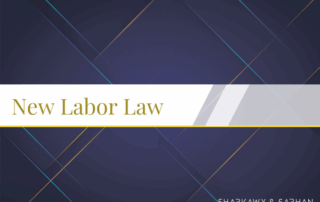29th of March, 2018
The Executive Regulations of the Gas Law
Keywords: Oil & Gas and Mineral Resources, Banking & Finance
Gas Market Downstream Parties, Get Ready To Buckle Up For A Wild Ride! The Executive Regulations of The Gas Law Is Out!
Background:
Back in August 2017, the Egyptian President issued the Gas Law no. 196/2017 (the “Gas Law”). The Gas Law was a bold step form the Egyptian government to gradually liberalize the gas market and, for the first time, opening the door for private sector to be part of the downstream gas market activities. The Law addresses only the downstream activities, transmission, distribution, storage, liquefaction, regasification, shipping and supply of gas (the “Gas Market Activities”).
The Law established the Authority for Regulating the Activities of the Gas Market (the “Gas Regulator”). The Gas Regulator’s main objective will be regulating and controlling the gas market downstream and midstream activities; securing the supply of gas to meet domestic market needs; and setting a plan to attract and encourage gas market investments.
On 14 February 2018, the Prime Minister issued the Executive Regulation of the Gas Law (the “ER”). The ER is relatively benign; it does not introduce substantial elaboration to the Gas Law. However, it sets out some regulatory rules, such as the Gas Regulator more elaborative role and responsibilities, the licensing requirements and conditions, etc.
The following outlines the key points to the ERBackground:
What do you need to do to comply with the new regime?
– Entities involved in the gas sector must approach the Gas Regulator to obtain an operational license, as of the date of the issuance of the ER. In case the aforementioned entities did not proceed to obtain the required license, the Gas Regulator shall be entitled to take all the necessary legal procedures towards such entities
– Multi-activity entities involved in the gas sector must comply with the conditions of the Gas Law and the ER within a maximum period of 5 years, as of the date of the ER issuance. The board of directors of the Gas Regulator, based on its own discretion, may extend the aforementioned period for another period of 3 years.
– The Gas Regulator shall put temporary regulations for the Gas Market Activities that will apply for a period of 1 year until the entities undertaking a Gas Market Activity have complied with the terms and conditions of the Gas Law and the ER.
What do you need to know about the license?
- The Issuance:
(a) The Gas Regulator shall issue its preliminary decision whether with the acceptance or the refusal on the issuance of the operational license within (45) business days as of the date all the required documents and information has been duly submitted.
(b) The Gas Regulator shall notify the applicants who have requested the issuance of an operational license with any missing data or information within (10) business days as of the day the operational license application has been submitted.
(c) In case the Gas Regulator issues its decision with an acceptance on the issuance of the operational license, the applicant must pay the required fees and the final insurance within (7) business days as of the date of acceptance. Once evidence of payment of the aforementioned fees and insurance have been submitted, the Gas Regulator shall issue the operational license and shall publish it in Al Wakaea Al Masria.
- The Duration:
(a) The duration of the operational license, depends on the nature of the relevant Gas Market Activity as follows: (i) operating a gas network or facility: 10 years; and (ii) transportation or supply of gas: 5 years.
(b) The Gas Regulator shall issue an annual certificate for the licensed entities evidencing the validity of the operational license.
- The Renewal:
The licensed entity must submit to the Gas Regulator a renewal request before the expiry of the relevant operational license within no less than 3 months.
- The Cancellation and Suspension by the Gas Regulator
:
In case of any breach by a licensed entity to any of its obligations or the terms and conditions of the license, the Gas Regulator shall notify the licensed entity with the breach and request the remedy of the breach within a specified period of time. If the licensed entity did not or failed to remedy the breach within the specified period of time, the Gas Regulator, based on its own discretion, may (i) suspend the operational license for 1 year until the remedy of the breach or (ii) cancel the operational license. Below are some of the violations that will entitle the Gas Regulator to terminate the operational license:
1. Non-payment of the annual licensing fees;
2. liquidation of the licensed entity;
3. in case any of the documents or information that were submitted as part of the operational license request was misleading or not correct;
4. in case the licensed entity ceased its operation for a period of one year unless the approval of the Gas Regulator was obtained;
5. if the licensed entity violated any of the operational license conditions; and
6. in case of any change in the shareholding structure of the licensed entity or assignment of the operational license to a third party or allowing a third party to operate the relevant facility all without obtaining the prior approval of the Gas Regulator.
- The Suspension by the Licensed Entity:
The licensed entity shall have the right to suspend its operational license for a maximum period of 1 year, provided that the prior approval of the Gas Regulator is obtained. Such suspension period may be extended provided that (a) the licensed entity submits a reasoned request to the Gas Regulator explaining the grounds for requesting such extended suspension and (b) the Gas Regulator approves such extended suspension.
- Assignment and Change of Control:
The prior approval of the Gas Regulator needs to be obtained in case of:
1. assigning the operational license to a third party or allowing a third party to operate the relevant facility; and
2. in case of any change in the shareholding structure of the licensed entity. Change in the shareholding structure shall include any action that will result in a change of control of the licensed entity.
A New Electronic Approach
The Egyptian legal reforms are heading towards an electronic regime, to bring the regulatory scheme in line with the international practices. Likewise, the ER stipulates that the Gas Regulator shall provide the gas market participants with all the decisions, templates, application forms, and codes through its website. In addition, all the correspondences and notifications issued by the regulator to the licensees shall be via e-mail, unless agreed otherwise.
At this stage, there are certain areas that are still not clear especially in relation to the ownership of transportation and shipping networks and the separation of activities criteria. The Gas Regulator is aware that there are still certain regulations that need to be issued to complement the Gas Law and the ER all of which are expected to be issued gradually throughout the coming period.
The Law established the Authority for Regulating the Activities of the Gas Market (the “Gas Regulator”). The Gas Regulator’s main objective will be regulating and controlling the gas market downstream and midstream activities; securing the supply of gas to meet domestic market needs; and setting a plan to attract and encourage gas market investments.
On 14 February 2018, the Prime Minister issued the Executive Regulation of the Gas Law (the “ER”). The ER is relatively benign; it does not introduce substantial elaboration to the Gas Law. However, it sets out some regulatory rules, such as the Gas Regulator more elaborative role and responsibilities, the licensing requirements and conditions, etc.
The following outlines the key points to the ERBackground:
What do you need to do to comply with the new regime?
– Entities involved in the gas sector must approach the Gas Regulator to obtain an operational license, as of the date of the issuance of the ER. In case the aforementioned entities did not proceed to obtain the required license, the Gas Regulator shall be entitled to take all the necessary legal procedures towards such entities
– Multi-activity entities involved in the gas sector must comply with the conditions of the Gas Law and the ER within a maximum period of 5 years, as of the date of the ER issuance. The board of directors of the Gas Regulator, based on its own discretion, may extend the aforementioned period for another period of 3 years.
– The Gas Regulator shall put temporary regulations for the Gas Market Activities that will apply for a period of 1 year until the entities undertaking a Gas Market Activity have complied with the terms and conditions of the Gas Law and the ER.
What do you need to know about the license?
- The Issuance:
(a) The Gas Regulator shall issue its preliminary decision whether with the acceptance or the refusal on the issuance of the operational license within (45) business days as of the date all the required documents and information has been duly submitted.
(b) The Gas Regulator shall notify the applicants who have requested the issuance of an operational license with any missing data or information within (10) business days as of the day the operational license application has been submitted.
(c) In case the Gas Regulator issues its decision with an acceptance on the issuance of the operational license, the applicant must pay the required fees and the final insurance within (7) business days as of the date of acceptance. Once evidence of payment of the aforementioned fees and insurance have been submitted, the Gas Regulator shall issue the operational license and shall publish it in Al Wakaea Al Masria.
- The Duration:
(a) The duration of the operational license, depends on the nature of the relevant Gas Market Activity as follows: (i) operating a gas network or facility: 10 years; and (ii) transportation or supply of gas: 5 years.
(b) The Gas Regulator shall issue an annual certificate for the licensed entities evidencing the validity of the operational license.
- The Renewal:
The licensed entity must submit to the Gas Regulator a renewal request before the expiry of the relevant operational license within no less than 3 months.
- The Cancellation and Suspension by the Gas Regulator
:
In case of any breach by a licensed entity to any of its obligations or the terms and conditions of the license, the Gas Regulator shall notify the licensed entity with the breach and request the remedy of the breach within a specified period of time. If the licensed entity did not or failed to remedy the breach within the specified period of time, the Gas Regulator, based on its own discretion, may (i) suspend the operational license for 1 year until the remedy of the breach or (ii) cancel the operational license. Below are some of the violations that will entitle the Gas Regulator to terminate the operational license:
1. Non-payment of the annual licensing fees;
2. liquidation of the licensed entity;
3. in case any of the documents or information that were submitted as part of the operational license request was misleading or not correct;
4. in case the licensed entity ceased its operation for a period of one year unless the approval of the Gas Regulator was obtained;
5. if the licensed entity violated any of the operational license conditions; and
6. in case of any change in the shareholding structure of the licensed entity or assignment of the operational license to a third party or allowing a third party to operate the relevant facility all without obtaining the prior approval of the Gas Regulator.
- The Suspension by the Licensed Entity:
The licensed entity shall have the right to suspend its operational license for a maximum period of 1 year, provided that the prior approval of the Gas Regulator is obtained. Such suspension period may be extended provided that (a) the licensed entity submits a reasoned request to the Gas Regulator explaining the grounds for requesting such extended suspension and (b) the Gas Regulator approves such extended suspension.
- Assignment and Change of Control:
The prior approval of the Gas Regulator needs to be obtained in case of:
1. assigning the operational license to a third party or allowing a third party to operate the relevant facility; and
2. in case of any change in the shareholding structure of the licensed entity. Change in the shareholding structure shall include any action that will result in a change of control of the licensed entity.
A New Electronic Approach
The Egyptian legal reforms are heading towards an electronic regime, to bring the regulatory scheme in line with the international practices. Likewise, the ER stipulates that the Gas Regulator shall provide the gas market participants with all the decisions, templates, application forms, and codes through its website. In addition, all the correspondences and notifications issued by the regulator to the licensees shall be via e-mail, unless agreed otherwise.
At this stage, there are certain areas that are still not clear especially in relation to the ownership of transportation and shipping networks and the separation of activities criteria. The Gas Regulator is aware that there are still certain regulations that need to be issued to complement the Gas Law and the ER all of which are expected to be issued gradually throughout the coming period.

The Executive Regulations of the Gas Law
29 March, 2018
Keywords: Oil & Gas and Mineral Resources, Banking & Finance
Gas Market Downstream Parties, Get Ready To Buckle Up For A Wild Ride! The Executive Regulations of The Gas Law Is Out!
Background:
Back in August 2017, the Egyptian President issued the Gas Law no. 196/2017 (the “Gas Law”). The Gas Law was a bold step form the Egyptian government to gradually liberalize the gas market and, for the first time, opening the door for private sector to be part of the downstream gas market activities. The Law addresses only the downstream activities, transmission, distribution, storage, liquefaction, regasification, shipping and supply of gas (the “Gas Market Activities”).
The Law established the Authority for Regulating the Activities of the Gas Market (the “Gas Regulator”). The Gas Regulator’s main objective will be regulating and controlling the gas market downstream and midstream activities; securing the supply of gas to meet domestic market needs; and setting a plan to attract and encourage gas market investments.
On 14 February 2018, the Prime Minister issued the Executive Regulation of the Gas Law (the “ER”). The ER is relatively benign; it does not introduce substantial elaboration to the Gas Law. However, it sets out some regulatory rules, such as the Gas Regulator more elaborative role and responsibilities, the licensing requirements and conditions, etc.
The following outlines the key points to the ERBackground:
What do you need to do to comply with the new regime?
– Entities involved in the gas sector must approach the Gas Regulator to obtain an operational license, as of the date of the issuance of the ER. In case the aforementioned entities did not proceed to obtain the required license, the Gas Regulator shall be entitled to take all the necessary legal procedures towards such entities
– Multi-activity entities involved in the gas sector must comply with the conditions of the Gas Law and the ER within a maximum period of 5 years, as of the date of the ER issuance. The board of directors of the Gas Regulator, based on its own discretion, may extend the aforementioned period for another period of 3 years.
– The Gas Regulator shall put temporary regulations for the Gas Market Activities that will apply for a period of 1 year until the entities undertaking a Gas Market Activity have complied with the terms and conditions of the Gas Law and the ER.
What do you need to know about the license?
- The Issuance:
(a) The Gas Regulator shall issue its preliminary decision whether with the acceptance or the refusal on the issuance of the operational license within (45) business days as of the date all the required documents and information has been duly submitted.
(b) The Gas Regulator shall notify the applicants who have requested the issuance of an operational license with any missing data or information within (10) business days as of the day the operational license application has been submitted.
(c) In case the Gas Regulator issues its decision with an acceptance on the issuance of the operational license, the applicant must pay the required fees and the final insurance within (7) business days as of the date of acceptance. Once evidence of payment of the aforementioned fees and insurance have been submitted, the Gas Regulator shall issue the operational license and shall publish it in Al Wakaea Al Masria.
- The Duration:
(a) The duration of the operational license, depends on the nature of the relevant Gas Market Activity as follows: (i) operating a gas network or facility: 10 years; and (ii) transportation or supply of gas: 5 years.
(b) The Gas Regulator shall issue an annual certificate for the licensed entities evidencing the validity of the operational license.
- The Renewal:
The licensed entity must submit to the Gas Regulator a renewal request before the expiry of the relevant operational license within no less than 3 months.
- The Cancellation and Suspension by the Gas Regulator
:
In case of any breach by a licensed entity to any of its obligations or the terms and conditions of the license, the Gas Regulator shall notify the licensed entity with the breach and request the remedy of the breach within a specified period of time. If the licensed entity did not or failed to remedy the breach within the specified period of time, the Gas Regulator, based on its own discretion, may (i) suspend the operational license for 1 year until the remedy of the breach or (ii) cancel the operational license. Below are some of the violations that will entitle the Gas Regulator to terminate the operational license:
1. Non-payment of the annual licensing fees;
2. liquidation of the licensed entity;
3. in case any of the documents or information that were submitted as part of the operational license request was misleading or not correct;
4. in case the licensed entity ceased its operation for a period of one year unless the approval of the Gas Regulator was obtained;
5. if the licensed entity violated any of the operational license conditions; and
6. in case of any change in the shareholding structure of the licensed entity or assignment of the operational license to a third party or allowing a third party to operate the relevant facility all without obtaining the prior approval of the Gas Regulator.
- The Suspension by the Licensed Entity:
The licensed entity shall have the right to suspend its operational license for a maximum period of 1 year, provided that the prior approval of the Gas Regulator is obtained. Such suspension period may be extended provided that (a) the licensed entity submits a reasoned request to the Gas Regulator explaining the grounds for requesting such extended suspension and (b) the Gas Regulator approves such extended suspension.
- Assignment and Change of Control:
The prior approval of the Gas Regulator needs to be obtained in case of:
1. assigning the operational license to a third party or allowing a third party to operate the relevant facility; and
2. in case of any change in the shareholding structure of the licensed entity. Change in the shareholding structure shall include any action that will result in a change of control of the licensed entity.
A New Electronic Approach
The Egyptian legal reforms are heading towards an electronic regime, to bring the regulatory scheme in line with the international practices. Likewise, the ER stipulates that the Gas Regulator shall provide the gas market participants with all the decisions, templates, application forms, and codes through its website. In addition, all the correspondences and notifications issued by the regulator to the licensees shall be via e-mail, unless agreed otherwise.
At this stage, there are certain areas that are still not clear especially in relation to the ownership of transportation and shipping networks and the separation of activities criteria. The Gas Regulator is aware that there are still certain regulations that need to be issued to complement the Gas Law and the ER all of which are expected to be issued gradually throughout the coming period.
The Law established the Authority for Regulating the Activities of the Gas Market (the “Gas Regulator”). The Gas Regulator’s main objective will be regulating and controlling the gas market downstream and midstream activities; securing the supply of gas to meet domestic market needs; and setting a plan to attract and encourage gas market investments.
On 14 February 2018, the Prime Minister issued the Executive Regulation of the Gas Law (the “ER”). The ER is relatively benign; it does not introduce substantial elaboration to the Gas Law. However, it sets out some regulatory rules, such as the Gas Regulator more elaborative role and responsibilities, the licensing requirements and conditions, etc.
The following outlines the key points to the ERBackground:
What do you need to do to comply with the new regime?
– Entities involved in the gas sector must approach the Gas Regulator to obtain an operational license, as of the date of the issuance of the ER. In case the aforementioned entities did not proceed to obtain the required license, the Gas Regulator shall be entitled to take all the necessary legal procedures towards such entities
– Multi-activity entities involved in the gas sector must comply with the conditions of the Gas Law and the ER within a maximum period of 5 years, as of the date of the ER issuance. The board of directors of the Gas Regulator, based on its own discretion, may extend the aforementioned period for another period of 3 years.
– The Gas Regulator shall put temporary regulations for the Gas Market Activities that will apply for a period of 1 year until the entities undertaking a Gas Market Activity have complied with the terms and conditions of the Gas Law and the ER.
What do you need to know about the license?
- The Issuance:
(a) The Gas Regulator shall issue its preliminary decision whether with the acceptance or the refusal on the issuance of the operational license within (45) business days as of the date all the required documents and information has been duly submitted.
(b) The Gas Regulator shall notify the applicants who have requested the issuance of an operational license with any missing data or information within (10) business days as of the day the operational license application has been submitted.
(c) In case the Gas Regulator issues its decision with an acceptance on the issuance of the operational license, the applicant must pay the required fees and the final insurance within (7) business days as of the date of acceptance. Once evidence of payment of the aforementioned fees and insurance have been submitted, the Gas Regulator shall issue the operational license and shall publish it in Al Wakaea Al Masria.
- The Duration:
(a) The duration of the operational license, depends on the nature of the relevant Gas Market Activity as follows: (i) operating a gas network or facility: 10 years; and (ii) transportation or supply of gas: 5 years.
(b) The Gas Regulator shall issue an annual certificate for the licensed entities evidencing the validity of the operational license.
- The Renewal:
The licensed entity must submit to the Gas Regulator a renewal request before the expiry of the relevant operational license within no less than 3 months.
- The Cancellation and Suspension by the Gas Regulator
:
In case of any breach by a licensed entity to any of its obligations or the terms and conditions of the license, the Gas Regulator shall notify the licensed entity with the breach and request the remedy of the breach within a specified period of time. If the licensed entity did not or failed to remedy the breach within the specified period of time, the Gas Regulator, based on its own discretion, may (i) suspend the operational license for 1 year until the remedy of the breach or (ii) cancel the operational license. Below are some of the violations that will entitle the Gas Regulator to terminate the operational license:
1. Non-payment of the annual licensing fees;
2. liquidation of the licensed entity;
3. in case any of the documents or information that were submitted as part of the operational license request was misleading or not correct;
4. in case the licensed entity ceased its operation for a period of one year unless the approval of the Gas Regulator was obtained;
5. if the licensed entity violated any of the operational license conditions; and
6. in case of any change in the shareholding structure of the licensed entity or assignment of the operational license to a third party or allowing a third party to operate the relevant facility all without obtaining the prior approval of the Gas Regulator.
- The Suspension by the Licensed Entity:
The licensed entity shall have the right to suspend its operational license for a maximum period of 1 year, provided that the prior approval of the Gas Regulator is obtained. Such suspension period may be extended provided that (a) the licensed entity submits a reasoned request to the Gas Regulator explaining the grounds for requesting such extended suspension and (b) the Gas Regulator approves such extended suspension.
- Assignment and Change of Control:
The prior approval of the Gas Regulator needs to be obtained in case of:
1. assigning the operational license to a third party or allowing a third party to operate the relevant facility; and
2. in case of any change in the shareholding structure of the licensed entity. Change in the shareholding structure shall include any action that will result in a change of control of the licensed entity.
A New Electronic Approach
The Egyptian legal reforms are heading towards an electronic regime, to bring the regulatory scheme in line with the international practices. Likewise, the ER stipulates that the Gas Regulator shall provide the gas market participants with all the decisions, templates, application forms, and codes through its website. In addition, all the correspondences and notifications issued by the regulator to the licensees shall be via e-mail, unless agreed otherwise.
At this stage, there are certain areas that are still not clear especially in relation to the ownership of transportation and shipping networks and the separation of activities criteria. The Gas Regulator is aware that there are still certain regulations that need to be issued to complement the Gas Law and the ER all of which are expected to be issued gradually throughout the coming period.
Insights
Disclaimer
The information included in this publication/client alert is not legal advice or any other advice. Publications and client alerts on this site are current as of their date of publication and do not necessarily reflect the present law or regulations. Please feel free to contact us should you need any legal advice related to the publication/client alert. Sharkawy & Sarhan (the “Firm”) will not be held liable for any compensatory, special, direct, incidental, indirect, or consequential damages, exemplary damages or any damages whatsoever arising out of or in connection with the use of the data, information or material included in this publication/client alert. This publication/client alert may contain links to third-party websites that are not controlled by the Firm. These third-party links are made available to you as a convenience and you agree to use these links at your own risk. Please be aware that the Firm is not responsible for the content or services offered by and of third-party websites, links as included in the Newsletter nor are we responsible for the privacy policy or practices of third-party websites links included therein.
Authorization of Use
The data, information, and material included in this publication/client alert are solely owned by the Firm. All rights related are reserved under the laws of the Arab Republic of Egypt. No part of this publication/client alert can be redistributed, copied, or reproduced without the prior written consent of the Firm.




